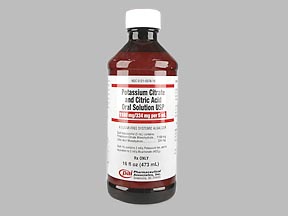
Cytra-k Coupons & Savings Card – Discount Prices from $17.82
Brand for: Potassium citrate-citric acid
My prescription
Edit
473ML of 1100-334MG/5ML, Potassium Citrate-citric Acid (1 Bottle)
Select pharmacy

CVS
$32.02
COUPON PRICE
Walgreens
$17.82
COUPON PRICE
Walmart
$35.59
COUPON PRICE
Albertsons
$35.91
COUPON PRICECytra-k savings card
Show this card to your pharmacist
Walgreens
$17.82
BIN
ID
PCN
GRP
015995
LHKPX748421
GDC
DR33
Powered by
More prescriptions for kidney stones
More prescriptions for kidney stones
Price history for Cytra-k (brand) & Potassium Citrate-citric Acid (generic)
1 Bottle, 473ML of 1100-334MG/5ML
Average retail price for Cytra-k
Average retail price for Potassium Citrate-citric Acid
Average SaveHealth price for Potassium Citrate-citric Acid
Our price history data is based on aggregated prescription data collected from participating pharmacies in America. Our prescription data updates daily to reflect the latest price changes. If you notice a missing data point, it means there wasn't sufficient data available to generate a monetary value for that date.
Over the last 12 months, the average discount price of Cytra-k is $38.17 using the SaveHealth savings card. That's an average savings of 78.51% on Cytra-k with our discount card.
*Retail prices are based on pharmacy claims data, and may not be accurate when we don't have enough claims.
Cytra-k (Potassium Citrate-citric Acid) dosage forms
Dosage Quantity Price from Per unit 473ML of 1100-334MG/5ML 1 Bottle $32.02 $32.02 473ML of 1100-334MG/5ML 2 Bottles $53.73 $26.86 473ML of 1100-334MG/5ML 3 Bottles $67.45 $22.48
| Dosage | Quantity | Price from | Per unit |
|---|---|---|---|
| 473ML of 1100-334MG/5ML | 1 Bottle | $32.02 | $32.02 |
| 473ML of 1100-334MG/5ML | 2 Bottles | $53.73 | $26.86 |
| 473ML of 1100-334MG/5ML | 3 Bottles | $67.45 | $22.48 |
What is Cytra K used for?
Cytra-K is used to make the urine less acidic. It is often prescribed to prevent certain types of kidney stones and to treat metabolic acidosis in patients with kidney problems. It may also be used to treat conditions where the body needs to maintain a more alkaline urine, such as in certain urinary tract infections.
What are the side effects of K Citra?
K Citra, which is a brand of potassium citrate, may cause side effects such as nausea, vomiting, diarrhea, and stomach pain. Less common side effects can include tingling in the hands or feet, muscle weakness, or an irregular heartbeat. If any severe or persistent side effects occur, it is important to seek medical attention promptly.
What are the side effects of Cytra K?
Cytra-K, a medication used to make urine less acidic, may cause some side effects. Common side effects include nausea, vomiting, diarrhea, and stomach pain. Less common but more serious side effects can include confusion, irregular heartbeat, severe muscle weakness, or signs of an allergic reaction such as rash, itching, or swelling. It is important for individuals to contact their healthcare provider if they experience any severe or concerning symptoms.
